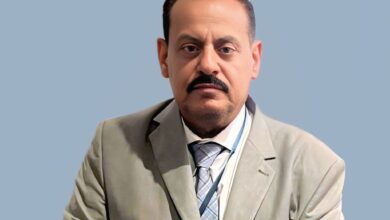Hunger

Yemeni mp
Ahmed Saif Hashed
Despite the presence of an internal section in the “Proletariat” school and dormitories for all its students, the food was poor, lacking in quality and quantity. It was insufficient to fill our stomachs, especially with hundreds of students, some of whom missed their designated meals because the cooked food ran out before reaching the last student in line.
The queue for meals was long, often witnessing scuffles among students due to the crowd or attempts by some to cut ahead. At times, when I missed dinner, I had to venture to the “Diemen” trees surrounding the school to quench my hunger. Sometimes my dear friend, the kind-hearted and self-accepting Mohammed Abdul Malik Hussein, accompanied me. Together, we shared unforgettable memories, some of which I will delve into later.
Occasionally, I would go to a nearby state-owned farm to study under the shade of its lush trees, stealthily plucking a few limes to sprinkle on our beans, which would ignite our appetites. Although the food was scarce, adding lime made even the little we had delightful. Yet, it barely satisfied half of what our stomachs required.
In our first year, we arrived during the season for planting jujube trees, and we would go to bed hungry at night as the hours stretched heavily upon us and our empty bellies, ravaged by the ferocity of hunger. Our patience wore thin as we had nothing to deceive our stomachs, which knew us all too well, protesting and crying out in hunger’s sharp pangs, while desolation surrounded us, save for a farm a twenty-minute walk away.
The tents of dried sesame stretched across vast areas unlike any we had ever seen, and we resembled little birds, satiating our small crops from the abundant harvest, or alleviating the hunger that tormented us, robbing us of sleep at night and exhausting us throughout the day.
The farm was neither fenced nor enclosed; its bounty was open, and the safety felt genuine. What we gathered was hardly worth mentioning, just enough to stave off our hunger, ease the tremors in our hands, and grant our weakened legs a semblance of resilience. Were we thieves that day? Or was our rebellion justifiable? Or was it merely the necessity of hunger compelling us?
* * *
Sometimes the line between propriety and crime is as thin as a hair, merging with everything around it until we can barely see it or distinguish it from our surroundings. It often confuses us, much like the crime intertwined with other acts in “Raskolnikov,” the protagonist of Dostoevsky’s “Crime and Punishment.” Yet, our motives were stronger, and our crime, if we consider it such, was lesser. Still, I find myself asking after all these years: Were we righteous or were we criminals?
What we did mirrored the actions of thieves, yet we acted solely out of necessity. Did they not say that “hunger is a disbeliever”? Did some not proclaim, “If poverty were a man, I would kill him”? And did the proverb not state, “Poverty eradicates all virtues”? What then, when both afflictions joined forces against us?
Hunger is a heavier burden than disbelief, and perhaps disbelief is not what many perceive it to be. Some have referred to it as “sweet disbelief,” while others have called it “disbelief of grace,” and the “grace” here is still debatable. There exists a variety of disbelief that does not reach the blatant form, and the blatant disbelief has a Lord who punishes its bearer.
* * *
Why do issues of hunger and poverty, despite their overwhelming and ever-expanding presence, fail to occupy the same level of consciousness and importance among those who create them as they do in reality? Why this dissonance in awareness, where the rampant tyranny of hunger is met with meager and demeaning aid, the cost of which is recouped by its providers through a thousand means and paths?
Why do the religious elites and groups distort awareness and concepts, misrepresent issues, and deviate from the paths of justice, even as they witness poverty and hunger, and the famines plaguing the world? Even worse, they seek to combat all of this with what they call zakat or “charity”!
Why do the religious and political groups in Yemen abandon their afflicted people, suffering both from their negligence and the war? Why do they forsake their moral responsibilities and legal obligations as de facto authorities, which impose upon them the duty of care for the residents and communities under their control?
One of the most pressing duties is to pay the salaries of workers and employees in the state administrative apparatus, as well as retirees and beneficiaries of social security—everyone affected by hunger and ravaged by famine in a war that has reached horrific depths, its effects extending throughout. Yet, they seem to desire its continuation.
As soon as political Islamist groups gain power and become de facto authorities, they abandon almost all the functions of the state, turning instead with determination to the appalling practices of looting and corruption, focusing their efforts on taxes, extortion, and humiliating their people while squandering their rights, dignity, and freedom.
They traffic in the homeland and blood, delve deeper into plunder and corruption, and beg for food from the nations of the world, all the while shamelessly trying to profit from this begging. Moreover, they speak arrogantly and brazenly about honor, dignity, values, virtues, and good morals.
* * *






